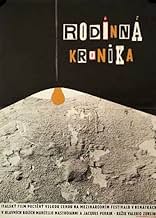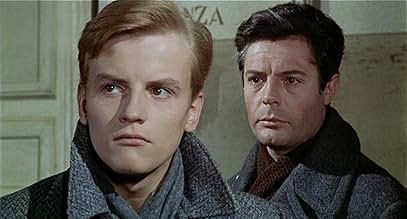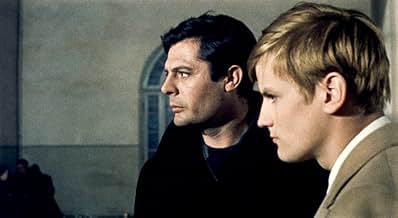NOTE IMDb
7,2/10
1,3 k
MA NOTE
Rome, 1945. Enrico Corsi, journaliste se souvient de la vie de son jeune frère décédé.Rome, 1945. Enrico Corsi, journaliste se souvient de la vie de son jeune frère décédé.Rome, 1945. Enrico Corsi, journaliste se souvient de la vie de son jeune frère décédé.
- Réalisation
- Scénario
- Casting principal
- Récompenses
- 5 victoires et 3 nominations au total
Angelo Casadei
- Un visitatore all'ospedale
- (non crédité)
Avis à la une
10Oskado
This is a film so great that to attempt to describe it nearly forces one into poetry. The visual flow alone is like a walk through all the great art galleries of the Western world, and the camera pauses on many of those scenes to permit us to admire and study the surprising compositions and tonal pallets. The story is viewed oddly in the third person - I felt somewhat like an astronomer viewing the short-lived movement of a group of comets through the coldness of space and time - helplessly seeking meaning and comfort through love, but doomed to end meaningless and forgotten - following some brutish laws of physics whose study seems a shrewd exercise in futility.
The scope of action is exceedingly restricted - perhaps more microscopic than telescopic - in the end, it's all the same: universal and intimate, cold and loving, helpless, with an odd image of Joseph's multi-colored coat haunting the mind - yet another symbolic object long rotted into the dust as must all symbols.
This is the work of people who have a very mature, objective understanding of life and who, without romanticizing or distorting or euphemizing, have created something both true and extraordinarily beautiful.
The scope of action is exceedingly restricted - perhaps more microscopic than telescopic - in the end, it's all the same: universal and intimate, cold and loving, helpless, with an odd image of Joseph's multi-colored coat haunting the mind - yet another symbolic object long rotted into the dust as must all symbols.
This is the work of people who have a very mature, objective understanding of life and who, without romanticizing or distorting or euphemizing, have created something both true and extraordinarily beautiful.
In war-ravaged Italy, tubercular journalist Marcello Mastroianni (as Enrico) learns little brother Jacques Perrin (as Lorenzo) has passed
In flashback, we learn the brothers were separated upon the death of their mother, and led different lives. They are reunited as estranged adults, grow to love each other as brothers, and are again separated by death. The co-starring lead actors give it all the believability they can muster - which, when you have Mastroianni and Perrin acting, is considerable - but, there is a noticeable age difference, they never look deathly ill, and are each distractingly handsome. As a result, they often seem more like lovers than brothers. Shameless as ever, Sylvie (as Grandmother) claims it's "easy to see" that they are brothers. Well, okay. Director Valerio Zurlini and cameraman Giuseppe Rotunno make this English-retitled "Family Diary" look amazingly beautiful - herein, a old radiator against a stark wall is a work of art. They, and the haunting performances, do make it worth watching.
******* Cronaca familiare (9/62) Valerio Zurlini ~ Marcello Mastroianni, Jacques Perrin, Sylvie, Salvo Randone
******* Cronaca familiare (9/62) Valerio Zurlini ~ Marcello Mastroianni, Jacques Perrin, Sylvie, Salvo Randone
Two brothers ;one of them,after his mother's death (she died during the birth)is taken in by a rich man,the other has to manage .But things will not turn out as expected.
The movie is a long flashback ,Enrico's somber meditation on his young brother's fate ,whom he only saw sporadically.There are a lot of holes in the plot,probably the weakest link of an unusual film.Mastroianni and Perrin (hardly 21) give strong performances which allow the movie to avoid pathos and melodrama.They are given strong support by madame Sylvie,as their grand-mother.What will strike you in Zurlini's film is the total absence of happiness,in the world which has forgot what it is to be happy:even the scene at the restaurant where the two boys invite their grandma is downright depressing;later the money the old lady gives to her grandson leaves a bitter taste in the mouth.All the scenes in the hospital are harsh,and may repel some.
It was the second time Zurlini and Perrin had teamed up,after "la ragazza con la valiglia".The last time ,in 1976,was the making of their masterpiece (Zurlini:director;Perrin:producer and actor) " Il deserto dei Tartari" from Buzatti's eponymous novel.
"Cronica familiare" is a movie that deserves to be watched,unless you're down in the dumps.
The movie is a long flashback ,Enrico's somber meditation on his young brother's fate ,whom he only saw sporadically.There are a lot of holes in the plot,probably the weakest link of an unusual film.Mastroianni and Perrin (hardly 21) give strong performances which allow the movie to avoid pathos and melodrama.They are given strong support by madame Sylvie,as their grand-mother.What will strike you in Zurlini's film is the total absence of happiness,in the world which has forgot what it is to be happy:even the scene at the restaurant where the two boys invite their grandma is downright depressing;later the money the old lady gives to her grandson leaves a bitter taste in the mouth.All the scenes in the hospital are harsh,and may repel some.
It was the second time Zurlini and Perrin had teamed up,after "la ragazza con la valiglia".The last time ,in 1976,was the making of their masterpiece (Zurlini:director;Perrin:producer and actor) " Il deserto dei Tartari" from Buzatti's eponymous novel.
"Cronica familiare" is a movie that deserves to be watched,unless you're down in the dumps.
How this one slipped off the radar screen is beyond understanding. Against a very muted palette of tone on tone, in which the character Lorenzo's beige over-coat becomes a metaphor of his indefinite link with the beige walled world, director Zurlini weaves a fascinating story of two brothers separated at birth, who effect a tragic reunion in war torn Italy.
Marcello Mastiroianni here offers a performance of greater depth than "La Dolce Vita" (which is just as it should be)but it is youngster Jacques Perrin's "Lorenzo" which surprises.
His performance, (indeed the whole film) is a study in the power of the reticence, understatement and the unsaid. Mr. Perrin's eyes, particularly in the hospital sequences, speak those volumes and light those vistas that would be trivialized in dialog form.
An excellent film with a core of deep sadness, that avoids the fatal commercial trap of sentimentalism.
Marcello Mastiroianni here offers a performance of greater depth than "La Dolce Vita" (which is just as it should be)but it is youngster Jacques Perrin's "Lorenzo" which surprises.
His performance, (indeed the whole film) is a study in the power of the reticence, understatement and the unsaid. Mr. Perrin's eyes, particularly in the hospital sequences, speak those volumes and light those vistas that would be trivialized in dialog form.
An excellent film with a core of deep sadness, that avoids the fatal commercial trap of sentimentalism.
Never heard of this film until 3/20 at 2 am..Thanks to TCM.. & Ive been a fan of Mastroianni & Italian cinema for decades... this is a real beauty..another hidden treasure.. really wanted to sleep (Im an insomniac) but couldnt It was magnificent..Mastroianni was one of the grreatest actors ever on Cinema.. & this film is special..same year as Divorce Italian Style & a year prior to 8 1/2...this film was hidden dont recall it being released in US theatres & was going to see his movies at that time..Mastroianni is magnificent, & as his younger brother, Jacques Perrin is outstanding as is the entire..(unknown to me ,cast) can't wait to see again..Must mention the photography.. filmed like beautiful Italian paintings subtle earth tones, realistic, soft yet striking..each frame is a work of art..Bravo..can't wait to see again & again
Le saviez-vous
- AnecdotesJacques Perrin had already played a boy named Lorenzo in the previous movie by Valerio Zurlini, "Girl with a Suitcase"
- GaffesIn the later sequence in the hospital, there are hairs on the film in several scenes.
- ConnexionsReferenced in Close-Up: Why do We Need the Venice Film Festival? (2024)
Meilleurs choix
Connectez-vous pour évaluer et suivre la liste de favoris afin de recevoir des recommandations personnalisées
Détails
- Durée1 heure 53 minutes
- Mixage
- Rapport de forme
- 1.85 : 1
Contribuer à cette page
Suggérer une modification ou ajouter du contenu manquant

Lacune principale
By what name was Journal intime (1962) officially released in Canada in English?
Répondre























